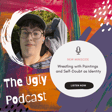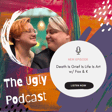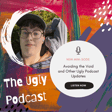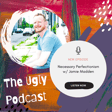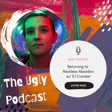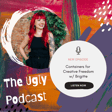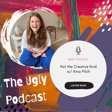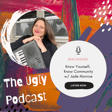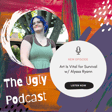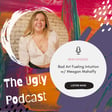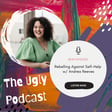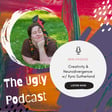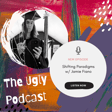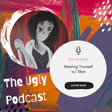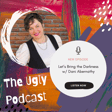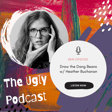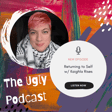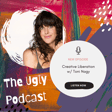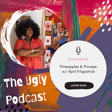Become a Creator today!Start creating today - Share your story with the world!
Start for free
00:00:00
00:00:01

It Started Out with a Memoir w/ Sarah Henn Hayward
In today's episode, I talk with Sarah Henn Hayward about her experience writing Giving Up God, a memoir about leaving religion. We talk about how she didn't feel very creative before writing her memoir, but the process of writing it awoke her creativity and led her to continue writing children's books and fiction.
Long story short, if you say yes to your ideas and get started, you might find that you have way more up in your brain than you ever thought possible!
Check out Sarah's website to learn more about her work! https://sarahhennhayward.com/
References
FFTs: Fucking First Time by Brené Brown
Transcript
Embracing Ugly Art and Creativity
00:00:04
Speaker
Welcome to The Ugly Podcast, the place where creatives are encouraged to make messy, ugly art and to redefine their relationship to their inner critic. I am joined by creatives of all mediums and methods to discuss our creative processes and how we navigate the mental minefield of creativity. This podcast serves as a reminder that you and your art get to be whatever the hell you want to be, ugly and all.
Introducing Sarah Hen Hayward
00:00:29
Speaker
Welcome back, everybody, to The Ugly Podcast. It's me, Lauren Theithem. And I've got another great guest for you. um My guest ah published her book last year, Giving Up God. And in the process of writing, it unlocked a previously undiscovered part of her brain. And she is now full of more ideas for books. She's been loving the process of writing and publishing. And she's excited to see where this journey will take her. Welcome. Would you please introduce yourself with your name and your pronouns, please? Thank you. Yes, I am Sarah Hen Hayward and I use she her.
00:01:05
Speaker
awesome Oh, and I'm still getting used to doing this. um I'm doing visual descriptions now in the podcast. So for listeners, I am a white ah person with very short curly, coily hair, big round frame glasses, and I'm wearing a sweatshirt with a bunch of ah wacky ah black illustrated designs on it. I am another white woman with a messy blonde bun and a black t-shirt and I am sitting in my living room. Awesome. Cool. Thank you. So I'm curious what was different about, cause you had written books previously, you have a series, a children's book series. um So what was different about like giving up God, um the book, writing the book? um How was that process different for you and what kind of realizations did you
00:02:01
Speaker
come upon?
Writing 'Giving Up God': A Personal Journey
00:02:03
Speaker
Yeah, so Giving Up God is actually chronologically not the first book I've put out, but it is the first one I wrote. Because I got a book deal with that one through a small publishing house that extended the whole process much longer than my self published books. Oh, okay. hu And so that was the first one and that one I wrote out of like a personal need and a necessity to process what I had gone through spiritually. And so that one just sort of organically popped into the world. I mean, it really did feel like it wrote itself like it wanted to come out, which is really cool to have that flow experience with writing like I have young children and at the time I started they were still
00:02:43
Speaker
but the youngest was napping and the oldest would watch TV while he napped. And so like during my nap breaks or as soon as they went to bed, I couldn't wait to just get back to the book and keep writing. And it just really flowed beautifully, which I know is not always the case for writing books. you I didn't have a book, thankfully, um because it was just this very personal story of what happened to me and how I went from such a devout Christian, which was my entire identity to being an agnostic atheist. and really asking a lot of identity questions and who am I now and what does this mean for my life? So the book was me, yeah, processing and kind of working through my own stuff and then wanting to reach out and find others who might be like me because at the time I was the only person I knew who had had that extreme of a journey and not just some doubts and deconstruction questions, but like, no, I'm done. God doesn't work for me at all anymore. um So that whole process was very,
00:03:40
Speaker
urgent feeling and compelling and and all that. The kids books I started so writing, giving up God, I just wrote because I needed to tell that story. But then having written it, I thought, gosh, I really enjoyed that. I really liked writing and there was like an addictive quality to it. It was very, it was just fun to see because it's an interesting experience writing, I think, because sometimes It's especially ironic now that i wouldn't I used to would have called it the Holy Spirit or some sort of outside muse seemed to come through me. I would write something and be like, Dan, that's good. And so I wanted more of that experience because it was so fun.
00:04:21
Speaker
ah hu And around that time that I finished that book, my daughter had started to read. She was in kindergarten at the time and they're reading by the end of kindergarten these days. And so I thought it'd be fun to write a book for her, um especially she was already being able to read a little bit bigger books. And a lot of the books that she wanted to read were kind of not at her maturity level. They were already like thicker for older kids or whatever. So I thought, oh, I'll do a children's chapter book for her and that would be fun. And then I had planned on self-publishing giving up God because I don't have connections and I've never had any published works before. So I didn't think I'd be able to get the book published. And so I had already purchased a bunch of ISBNs to use on the, like for the barcodes. And so I was sitting on these ISBNs and I thought, all right, I might as well figure out how to self-publish and put these kids books out there and do that.
00:05:14
Speaker
So that was a very cool learning experience, because then I had to figure out how to do the book design and the cover and the layouts and all of it. And so that whole process was very enlightening and educational and a lot of FFTs,
Self-Publishing Children's Books
00:05:30
Speaker
Brene Brown's fucking first times. yeah whatever yeah but Once I've done it once, now I have two other kid books, because now you know, kind of figured out the ropes and So yeah, that process has been very fun and very low stakes. I don't really promote those. I don't have any ads. I have no money into them. I just did the covers myself. and
00:05:52
Speaker
ah So it's fun. It feels very, no strings attached. And there's a, you know, a freedom about that. It's just out there. And if anybody happens to stumble across it, great. You know, they make me maybe $6 in royalties a month. It's not going to be my side hustle, really. But one, one funny thing. I was just on your website, just poking around. before we jumped on this recording. And I noticed, I was like, that font looks familiar on your kids' books. And it's the font for my my ugly podcast. What is it? So we think alike and like playful, fun fonts. Yeah, it was a good kid font, I thought. yeah Precisely.
00:06:34
Speaker
great minds and be like, yes. Yeah, yeah yeah i I think it's interesting that like, we don't, and we, we've talked about this of like, we don't, if we don't think we're creative, we won't make anything. And then you have that idea and that itch. And if you sit down and actually execute the idea that you have, then you have like all these realizations of like, Oh, whoa, like there's way more up in my brain than I thought and can spark so much more creativity when you actually sit down and do instead of waiting for creativity to come to you, yeah um like actually getting started. Was it when you first had the idea for giving up God, did it
00:07:19
Speaker
I guess, did it take a long time for you to get started? What, like, how long was that process of, I have this story I need to tell. I'm actually, okay, no, screw it. I'm actually going to do it. yeah right I think it was all fairly quick and I almost in retrospect would have paused longer because I didn't, I had made it very personal. This had happened to me. It was such a dramatic schism. And I just felt like, I don't know what to do here. I don't know what I'm doing. I don't know who I am. So I just was like blindly groping and reaching out.
00:07:54
Speaker
um And process wise, like I wrote an outline, I kind of developed the general flow I wanted to do, starting with kind of the deconstruction journey and how I ended up where I did and then different identities. I sort of tried on or filter through as I rediscovered who I was outside of God. So the the general idea came to me that way in the outline. And then it was a matter of just pounding it out chapter by chapter. um But I wish I had held back a bit and thought it through because my one regret in the whole process is I didn't really
00:08:32
Speaker
process it out loud a ton with my partner. And he was really hurt because we both married each other on the condition that like, at the time, we would have not married a non Christian or somebody who wasn't a believer. And he understood where I was at. But I, it was a very, I guess, private process, the whole thing. And then I just started writing the book, which is also very private, you know, just me in my head and on the laptop. And so I wish that's my one regret that I could have maybe done a little more processing with him explained why it was so important to me to write this book because I felt so alone in that journey.
00:09:07
Speaker
I think that would have saved us a little bit of hurt and stress on the marriage. See, it all happened very quickly. And at the time, too, it was the pandemic. It was 2020 when I had kind of come to that conclusion in 2021 when I wrote most of the book. And so it just felt like this weird twilight zone. you know Looking back, it was like all in a fog. And it was like, all of a sudden, this book was just here. Sorry, experience. And then I'm like, I have to get it out in the world. And my husband in the meanwhile is just like, what the hell just happened? You know, so where did this come from? Pretty quick.
00:09:48
Speaker
yeah oh Wow, that's really that's very interesting. um I love I i do love memoir's ability to help us process in real time. like And I've talked to other people who've written memoir, and ah theyve ah one of my previous guests, um Kayla Rises, does not recommend people writing memoirs the way that she wrote hers, which was like using it to like deep dive process everything that happened. And so it's very raw and very like dark.
00:10:21
Speaker
Um, but like, that's kind of the beauty of memoir is being able to write your story, how you want it. And like, in writing the story, you get the results that you want to see in your life. Cause you're like, this is my story and I'm telling it this way. Um, it gives you some like creative control over your actual life and your actual feelings and your actual processing of the situation. I think writing memoir is awesome. That was hugely therapeutic for me. It helped me just crystallize what it was I thought now because I had to sort of re rethink a lot of, you know, do I still value all the same things? Am I still motivated to make similar decisions or live, you know, life the same way? And if I am why or if I'm not, you know, what is my motivating factor now? So it was a lot to think through. um So yeah, the writing, it was really helpful for processing and, and yeah, kind of
00:11:14
Speaker
helping me redefine what it is that I valued and cared about and why. um And then it was just so putting it out into the world has been a beautiful experience. I feel really lucky that I haven't been too attacked by it, you know and it's a very sensitive topic. oh yeah for sure I think it's because the algorithm has never liked me, so it's just not getting seen by people.
00:11:37
Speaker
And somehow sometimes it's a blessing not to be seen by the algorithm. Yes, it's a blessing in occurs. So yeah, it's been mostly positive feedback of other people in similar boats who appreciate it and are grateful to feel seen and understood by somebody else just what I was hoping to do. So yeah that part has been really um restorative and like, justifying kind of. Yeah, I bet. I love that. what was your What was your relationship to creativity
Redefining Creativity Beyond Tradition
00:12:08
Speaker
prior to that? Yeah, so i we had mentioned in some of our earlier questions how I never felt like I was a quote unquote creative person. I think literally because I just defined creativity as like painting. And I don't paint, you know, or I didn't.
00:12:25
Speaker
um My mom was always more of a creative type and she did a lot of different, she knit and she made her own cards like stamps and she would do very elaborate scrapbooks. And none of that ever appealed to me. And so I thought, well, that's creativity. I'm not creative, I guess, you know? Art class was never a big draw for me. I liked photography. I did do a film photography class, but even that felt more technical than, again, being creative to me meant you created it with your fingers. the Right.
00:12:56
Speaker
Yeah. And so yeah, I just didn't consider myself to be creative. But then when I was in grad school, I'm trained, I'm a physical therapist is like my day job. And so I was in school for a long time. And it's kind of a, an outlet away from studying so much I did start drawing just with like colored pencils, to which to me again felt not legitimate. So all that was just a hobby, you know, but as I look back, I realized I have always had a creative angle somewhere, either I do write a lot, I've always journaled, and that's been a place for me to be creative or process. um I wrote some really bad poems back in the day in college, and i yeah in my old journals that are embarrassing. And and then when I met my now husband, I had mentioned to him that I always was interested to try painting or something else like that, but that I just had never really
00:13:53
Speaker
Like you said, just done it, just started. And so a gift of he and I complimenting each other. He just went out and built me an easel. It's like, you say you want to paint, let's see it. Go ahead. Oh, I love that. For Christmas, I got an easel. So now I have tried some painting. I get very DIY, no skill, and just figured me out on my own. But yeah it is it's enjoyable. I found it's I like just the act of doing it, just mixing the colors and developing a picture. And, you know, half of them have ended up painted over in the trash or hidden away in hallways. But so yeah I think, yeah, I've started to slowly accept that creativity can be a lot of different things and that
00:14:40
Speaker
I don't have to be a professional artist or like actually trained in order to be a creative person that it counts, even if it is just colored pencils or just a hobby. Yeah. Yeah. Absolutely. I, I'm so curious about this phenomenon because I've talked to so many people who didn't think they were creative at some point in their lives. And like so many people that I just interact with daily are just like, Oh no, I'm not a creative person. Um, and I just, I don't know. like When did this happen? was it i I am prone to just blame capitalism. I think that capitalism made like creativity die because we thought that, oh, in order for something to be considered creative, I have to do it for a living or someone has to buy it. or something like I don't know. me Maybe it's that, but I don't i don't know. But there's somewhere along the line of like
00:15:32
Speaker
humanity evolved. We've always been creative. We've always been inquisitive and curious. And then somewhere along the line, it was just like, nope, creativity is not for everybody. I'm just like, when did this happen? I don't know. Someone needs to tell me this. I'm so confused. Like, when did we stop thinking we were creative? My tendency would be to blame the like growing awareness of each other, probably through social media type stuff, of seeing really skilled creatives being amazing, now hearing all of the artists and singers and reading all the amazing
00:16:13
Speaker
And to compare and be like, oh, well, if that's an artist, I'm definitely not that. Yeah. Or maybe like museums even, just like what ends up in museums are like those beautiful, like, you know, Renoir paintings and like the Mona Lisa. And so we're like, well, that's clearly art and that's not what I do. So then people just. ah assume that doesn't fall, they don't fall under that umbrella. I don't, I don't know, or maybe like education system, because we know we're just, we get into, you know, the regurgitation model of learning instead of creativity. And even though our class was like an elective, it was yeah considered maybe your easy pass or, you know, like, kind of not taking this seriously, or certainly not part of a core curriculum for anybody. Right. Yeah, exactly. Yeah. um And I think about
00:17:06
Speaker
I think it was the the Bronte sisters who wrote plays and and ended up writing Wuthering Heights. They're now classic books, but they were just like living out in the country by themselves and just wrote to entertain each other. and I think one of them even had to sneak and steal her sister's manuscript to publish it because she was like, no, no, that's my private thought. And now it's considered one of our great you know works of literature. So people just probably did it without yeah expecting an audience or certainly without knowing what other people were writing to to compare and contrast and just did it because it felt
00:17:43
Speaker
fun or important or whatever. Yeah, or because they were bored. I mean, if they're doing it to entertain each other is probably because they were bored. but We need to do something and then we got the internet and we're like, we're never bored. Yeah, yeah. And blame the internet and capitalism. Yes. There's always something to blame. Yes. But it is too bad because once you start, you realize it's just enjoyable. It's just fun to make stuff. I've done little paintings that I really love that nobody's ever going to want to purchase or it's not going to get hung up anywhere. But I look at that and I think I made that. And I think it's really pretty or whatever. It's such a gift. It's just nice to make things.
00:18:26
Speaker
I agree. ah And I've started like sharing little things with friends too, just like little scribbles that are truly nothing, but it's just fun to see what we make. And yeah, I think it's just it's a really nice way to connect with people and with ourselves. and it's It makes me sad that so many people don't see themselves of as creative. I'm like, yes, you are. I just want to shake you and give you a colored pencil. And I don't know. Like you said, it's it's part of how humans have always been, just that curiosity piece. Like at one point in time, it was creative to develop new technologies. Like somebody with the wheel, that was a creative act, just even thinking it outside of art and putting it into
00:19:14
Speaker
creating ideas or creating concept that is our strength as humans. That's why we've ended up as the dominant species, for better or for worse, is that creative power. yeah Exactly. Well, that's that's one thing that i I loved about my journey with you know making ugly art and the realization which I've had and which other people have had Since they since I forced them to make ugly art is like oh this doesn't just apply to paint on a page this applies to other things that I want to
00:19:52
Speaker
like bring this curiosity and this creativity into that other part of my life. And that can be anywhere from, you know, how you interact with your friends to playing music to, I mean, technology or gaming or Dungeons and Dragons. Like there's just like so many ways to um explore creativity. um That's not just painting a picture or writing or being doing something that is stereotypically, quote unquote, creative. Yeah. Yeah. Yeah, for sure. It's an attitude, like a whole life. Yeah. Yeah. I think it's very fun. Mm-hmm.
00:20:34
Speaker
Yeah.
Future Writing Ambitions and Poetry Challenges
00:20:35
Speaker
Is there anything um that you're working on now that is particularly exciting or ah something with your creativity that's maybe challenging? um So that I have same answer to both angles of that question. So great. um Writing these kids books has just been kind of fun and they're pretty easy to pop out. So that's been enjoyable, but I have ideas to write more grown-up books or like and I have a novel idea that I really want to write and maybe even another nonfiction type book and the novel I'm very excited about because I can see it in my head and I think it could be really good but it same for me with painting what I see in my head does not always come out as um but that's um the give um and it's very ah
00:21:25
Speaker
ambitious because it would be a almost more like a series of short stories that would be connected, but it would feel like a bunch of different stories within the book, all set in different times throughout prehistory to now. And so a lot of research involved, which I get overly technical in my head and feel like this should be textbook college level accurate, but like no one is going to care or look up and check me on those facts. um So I've hamstrung myself a lot. like I don't even know where to start because I need to learn everything about the development of agriculture in China before I can even start writing. like
00:22:03
Speaker
Maybe I can wing it a little and use creative license.
00:22:10
Speaker
That's really funny. one ah My favorite phrase to tell people ah who are struggling with like being too technical in their writing is, this is a problem for my editor. I don't know exactly how this thing worked in this historical time period. It's a problem for your editor to figure it out. one
00:22:32
Speaker
Well, then that brings up another issue with creativity as a whole, like real talk, hiring an editor costs money. I mean, the money I put into giving up God, I have not recouped yet. And I don't know if I ever will, because it's not going to be a bestseller. And so that's been another thing. Like if I write another book, my husband and I have already talked about like, it will have to be years down the road because I need to like save up the budget of it costs, you know, five to $6,000 to make a book. yeah if you're going to do it right. And that's probably on the cheap end because I had a friend developmental edit it for me, which was a massive gift. Yeah. Developmental editing, stuff like developmental editing alone can cost like five grand. So yeah. Yeah. yeah So thinking about using the creativity, you know, actually trying to maybe
00:23:24
Speaker
not even for the sake of monetizing, but just to be able to share it with people. um And free yeah painting in the basement where no one will see it like fine. You just got to buy your paints, I guess. But um yeah, so I really want to write this book. I can feel it. And it it calls to me like I did before where I really want to write. But it's intimidating and thinking about to make it really good would include hiring professionals to help. Um, and that can definitely be a barrier. So um we'll see. I'm, I'm hopeful, but it'll probably be years and years down the road. Yeah, that's totally fair. I think one of the beautiful things about the internet is how versatile or how diverse and the dial, I'm going to be able to speak soon, uh, the, the diversity of options that you have for publishing, because like.
00:24:17
Speaker
It's not even though like, you know, publishing a physical book or an e-book is usually like the goal or the image that we have in our heads. Like there's so many different ways that people connect with content these days um like, you know, paid blogs or, um you know, just there's just a lot of interesting ways that people get their art out there without having to, you know, make those big um yeah big payments but i mean yeah Unfortunately, working with human beings in today's economy is expensive.
00:24:53
Speaker
Well, I'm probably too vain to put it out there unedited. I could just post publish it rough as it do my best and make it as good as I can get it. um But having seen what the editors did with Giving Up God, I'm like, oh, they made it better. They made it just sound better and feel better. um It was still very much my word. you know it's so That's a cool little alchemy the editors have where it's still definitely my voice, my words, but it just, yeah, made it better. um And so to put out one that I haven't hired anyone to help with is like, Oh, do I want to put my name behind that? That would be a different experience. Yes, that is. That's also totally fair. Yeah. Which case in point, the kids books, the second one that I have three out, I've
00:25:42
Speaker
it's on its third edition, which sounds fancy, but because I just kept finding typos. I need to upload a new one again. oh That's really funny. I'm human.
00:25:56
Speaker
Yeah, but I do. Yeah, I've really enjoyed writing specifically. And even this month, I've been doing um on Instagram, ah write a poem a day for the month of May. And so that's been really fun and not with any goal of monetizing. I'm sharing them publicly on my Instagram, but that's as far as, you know, as I'm doing with them. um And so that's been really fun. I definitely never thought of myself as a poet. And so I was inspired by you to be like, make it ugly. It doesn't matter if it's good. Just do it. So they're not ever going to win any awards or poetry or anything, but I've really enjoyed that. It's, um,
00:26:37
Speaker
It's been a guided thing through Caitlin Curtis, who is an author that I really like. So it's ah kind of a challenge that she's doing this month. So she sends out the prompt and a word to kind of use to go off of for your poem. So it's been really neat. So I might try hunting out more things like that of like writing challenges or, cause it's nice to have a little bit of guidance to it instead of just yeah a lot of the writing advice that people give is you have to write every day, you know, sit down and pound it out. It's like, well, That can be hard if you don't have anything at top of mind to say or sort of have ah a little bit of a guide is nice. So I've really enjoyed that whole process this month of writing bad poems. That's awesome. I love that so much. oh that's really I think that's a really fun practice.
00:27:23
Speaker
Um, yeah, I've never really been able to get into like the, you know, what is it? Three pages a day or whatever, or 10, I don't know. It's like five or 10 page. I can't remember what it is, but yeah. Uh, from, is it the artist's way that talks about that? Mm-hmm. Daily pages. Yeah. Yeah. Yeah. I haven't been able to get into that. Well, especially because most of us, it's a side hustle or a hobby. Right. You know, it's like we have day jobs and lives and it's hard to find the time. Yeah, it really is. I always i try not to push everything out to one day, you know, one day when I'm retired or one day when the kids are older, I try to think, nope, this is it. This is now. And you don't know if one day is even coming. um But it is tempting to think, well, I'll have more time eventually, right? ah right I don't know. We might not. Yep. Yeah. yeah
00:28:21
Speaker
Do you consider your creativity mostly to be painting and drawing or do you write as well or what do you like to exercise those muscles in?
Processing Life Changes Through Art
00:28:29
Speaker
Yeah, I also write. um I collage, I paint, um I use like Crayola markers. um Just scribble my scribble my cares away. um Yeah, right now collage is really the main thing I'm doing. um I write mostly right now writing is much more processing. I think ever since ah my divorce last year, all of my writing has been just very much like kind of processing and discovering like who I
00:29:02
Speaker
am and what I'm experiencing um and who I want to be. um I haven't been able to focus. I've had a few like fiction ideas, um but I haven't been able to really sit down and focus on them just in this season of my life. you know um So yeah, I am excited to get back into writing short stories though, like little mini stories. Have you heard of and NYC Midnight? um They're a really cool group. They do um they do writing challenges frequently and they'd have like they have a ton of them. Like right now there's one starting, I mean, not right now when we're recording this in May, you're listening to this in August or whenever. So yeah they'll have different ones up, but they um in may and ah starting in June, they have ah flash fiction, which I think is a thousand words.
00:29:56
Speaker
And then like in July I'm doing their like ah microfiction, which is 500 words. okay um And they do like they do all kinds of, and but what the cool thing is, so it is ah it's a paid thing to join, but the cool thing about it is they give you feedback on your story. ah hu um So thats they tell you like a list of things that you did well and a list of things that could have been improved. um So even if you don't like win and get advanced to the next level, you still have like this great feedback on your writing and can kind of take that with you.
00:30:30
Speaker
Oh, that's awesome. um Yeah, I think they're great. I did. I had one story go to the next level. and That was very exciting. But then I didn't then I didn't get it. There is a challenge aspect to it. where Yeah. What is the prize or how does it how far does it go? Yeah, there is a grand prize. I can't remember how much it is, but it's like a monetary prize of like a I want to say a thousand dollars or a couple thousand dollars or something. But yeah, I think there's three, three tiers or three levels that you have to complete. Oh, okay. Yeah. Oh, neat. But yeah, it's very fun. They give you like a, they give you a genre and then a word you have to incorporate, an action you have to incorporate and a character. Hmm. Yeah. Okay. And like, it's usually like the occupation of the character or something. Yeah. Oh, fun. Oh, I'm going to check that out. Yeah, it's really fun. Yeah. Yeah.
00:31:26
Speaker
I'll have it. I'll have it linked in the show notes for people. Yeah, yeah that's what it's neat to have that framework. I think it's weird. There's a parenting book I read that talks about raising kids. it It was like the French style, I guess. And so they have a system they use where it's like a rigid frame, but then total freedom within that. And so I like that analogy for, I think it works well with kids because kids do thrive on routine. and being able to predict something in the world, you know, knowing when you're going to eat or go to sleep can be comforting. um But then within that, when they're just playing at home, it's like total freedom to be naked or playing, you know, doing whatever you want. And so I think creatively that approach helps me to have that frame of like, okay, yeah, here is the the general gist of the genre, the story, the character, but now write what you want. It it like helps to,
00:32:25
Speaker
I guess get the juices flowing somehow to have that starting point, I think. So that seems like a great approach. Yeah, you don't always have to like come up with everything directly from your brain. you can take You can pull and take information from other places and ideas and yeah have someone actually give you rules to follow. And yeah that's still creativity. Yes. I have been writing, actually. I've been publishing essays with a local um local to Spokane where I live.
Writing for Interfaith News Service
00:32:53
Speaker
interfaith and no faith news service called Faves, Faith and Values Spokane. And so I write for them and I just made it my personal goal to try to do like one essay a month or so. But that's been hard because I don't have any guidance. It's just right on whatever. It can be spiritually themed or religious themed, but it doesn't even completely have to. It can be more current events. So I have written some stuff to help me process current events going on.
00:33:22
Speaker
yeah um But yeah, to have just like zero guidance at all is way more intimidating to just start with a totally blank slate than right about this topic that that helps quite a bit. Yeah, definitely.
00:33:40
Speaker
Yeah, I guess what kind of advice would you give to creatives who are just. You know what, I'm going to ask this for myself. So I'm in this i'm in this funky space with my creativity where i I love it, I'm still using it, but it feels like, I don't know, I'm like missing something. Maybe it is like a direction to go, but I'm feeling kind of aimless in my creativity.
00:34:16
Speaker
I don't know. Any thoughts on that? I'm just going to use this as my own personal therapy session. Not a therapist warning. Therapy was the wrong word. No, therapy was the wrong word. ah I guess coaching session. proud Yeah. ro' yeah
00:34:36
Speaker
love em I do think because I've definitely fallen into funks a lot. And it's hard, especially if things in the world feel heavy, which they do right now. I think it can feel almost frivolous to go paint pretty pictures or color it feels like there are people literally dying right now in many places around the world and that's always been true. There's always been people suffering and there's always been lucky ones like us that happen to be safe right now. wow So it almost can be honoring to life itself to just take take advantage of your security and use that to be able to be resting or creative or you know, um it's a gift and I think appreciating that for what it is.
00:35:23
Speaker
I tend to fall into guilt and I think a lot of that's because of my religious upbringing. It's like the survivor's guilt. right And that's not serving anyone. Now it's just going to ruin my life and the people I'm worried about as as hard as it is to accept. There's very little I can do about people suffering on the other side of the globe. you know I can donate some money. I can write my congresspeople, but that's realistically most of what I'm capable of doing. so
00:35:52
Speaker
acknowledging my care and compassion, but then also moving on and living my life. Like it feels it's a very, for me a very hard ah line to thread, but yeah I do think it's, it's in a way honoring of people going through tragedy to say, well, I'm going to make sure that I then am living my life to the fullest and not taking it for granted and realizing that it's a gift that I'm here and trying to make the most of every day. So I try to use it as, motivation when I get bogged down in like empathy, crushing guilt.
00:36:27
Speaker
ah And so I would encourage you to, you know, process those feelings, but realize like, I don't know, not to get stuck in a quagmire because you know, other people are trapped right now. Yeah. Yeah. I think, I think the thinking of it as frivolous is an interesting, an interesting thing that I I think about a lot like what kind of art do I want to like
00:36:58
Speaker
like put out in the world but then what kind of art is just for me I guess um and like maybe feeling a pull toward wanting art that I do feel compelled to share which when I'm intentionally making art that is often quite bad is hard to do to offer that up to the world just be like yeah here's this thing it's terrible but like Uh, you know what beauty is also in the eye of the beholder. Some of the smells I'm like, and I like, and I like a lot of my really ugly stuff. So and you never know. But, um, ugly as somebody else's amazing. It's true. It's true.
00:37:40
Speaker
yeah I don't know. My brain is in a and a funny place today, so thank you for for being here with me in this weird space. Do you think that going public with what you're doing or you know showing it in some way, for me, that's very motivating. so Before I even wrote Giving Up God, I had recognized that writing was very helpful for me because I had always tried to privately journal. again Growing up religiously, it was quiet times and daily you know prayers. And I had fallen off of that quite a bit as I just entered the real world after school and you know didn't have as much time. But I had recognized that the writing and the act of writing itself was so helpful to me. And so I started a blog years ago, and I thought just that little bit of accountability of thinking somebody out there might be reading this and waiting for the next post, that was motivating to get me on it at least a little bit more consistently. so um Yeah.
00:38:37
Speaker
Sometimes it doesn't have to be with the thought of going viral or selling, but just putting it out there publicly for that like accountability piece that can kind of go a long way. Yeah, definitely. I like that. Or setting goals. You have the directionlessness. Maybe give yourself, make art about what's happening in the world. you know Make art for Gaza or make art for whatever is on your heart. yeah And again, even if you're not going to do much with it, that act of making it can be helpful. and if that's what's really, you know, taking over your mind space, well, work with it and use that. Yeah. Yeah. No, totally. I agree with that. Totally. A hundred percent. Yeah. Or, you know, you're allowed to take breaks and not do it. I tell myself that too. Very true. And not obligated to create as much as it, it's like working out, you know, it's good for you. You know, it would help. Yeah, I know. iate arrest Yes. A hundred percent. And it's so like,
00:39:34
Speaker
Yeah, it's so funny. Just like everything you're saying, like, you know, we know these things we know, like I've been talking to like I've been talking to creatives for the past. two three years on this podcast? How long has it been? I think it's been three years now, almost. Um, like talking about all these concepts and still like when you're in the creative funk, it really doesn't matter how much you know, and how much like good advice you have, you're still going to feel in the funk. It's just, you know, and you just have to live there for a little bit and it's okay. Yep. Yep. Yeah. yeah lean and
00:40:13
Speaker
So if anybody else out there is struggling with their creativity, you're not alone. Never alone in that. um Cool. We're coming up to the end of our ah session
Creating Personal 'Ugly' Poems
00:40:26
Speaker
here. um What is something ugly you've made recently?
00:40:33
Speaker
um i In writing the poems that I've written, not only are some of them ugly, but I've had drafts that I didn't publish and i I realized some of them were things that I needed to write but not publish and just write for me. And so the process of trying to write a poem for that prompt of the day brought up stuff that it's like, you know, sometimes I need to just let it all flow and it's not meant to be ever shared. um And so yeah, there's been, they were less poems and more just like streams of thought.
00:41:08
Speaker
no But that was, I think, something I needed to either hear or say, you know, letting it out or talking to myself. um So some some very ugly poems that were important for me to hear or to to get off of my chest. Yeah. Yes. And I think sometimes making those, sometimes I can't even see it. It's like laying the groundwork for something else. Like it's a very rough idea that's kind of in my head, but it's not at all processed. You know, it needs to be like chiseled out. And so writing those first very ugly thoughts down inversions kind of just starts the, starts the ball rolling and maybe it'll get polished up one day, maybe not. But, um, yes, you just sometimes do have to start somewhere and
00:41:57
Speaker
letting it out even if it doesn't look pretty. Yes, yeah definitely. Cool. Yes. I love that. Well, thank you so much for joining me, Sarah, and for yeah just chatting about the creative process and what it's like for us and just, yeah, you're great. Thanks. Where can people connect with you? So I'm the most active on Instagram. I'm S Hayward writes on there. And then I have a website that I do try to post some of my regular blogs and I share my podcast episodes I've done or the articles I write for that faves group, all on my website, which is sarahhenhayward.com. Excellent. Yes.
00:42:42
Speaker
And yeah, if you haven't already, go check out ah giving up God. It's it's a great book. um And thank you everybody for listening and keep it ugly. The Ugly podcast is created by me, Lauren Alexander of Scribe and Sunshine. It is produced and sort of edited, also by me, and written and directed by absolutely nobody. If you like the podcast, be sure to rate and leave a review on your preferred platform and share with the creative people in your life. If you're interested in learning more about what I do, head to scribeandsunshine.com to learn more about my Ugly Art 101 course, my perfectionism workshop, and my editing services. As always, keep it ugly.

